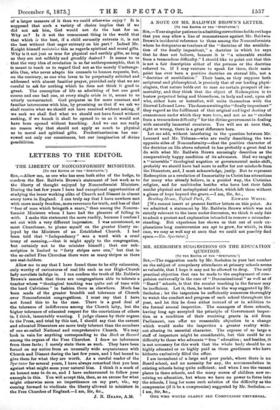LETTERS TO THE EDITOR.
THE LIBERTY OF NONCONFORMIST MINISTERS.
[TO THE EDITOR OF THE SFECTATOR:]
Stn,—Allow me, as one who has seen both sides of the hedge, to confirm the Rev. Baldwin Brown's statement of last week as to the liberty of thought enjoyed by Nonconformist Ministers. During the last few years I have had exceptional opportunities of studying the inner working alike of Church and Dissent in almost every town in England. I can truly say that I have nowhere met with more manly freedom, more reverence for truth, and less of that "fear of man which bringeth a snare," than among the Noncon- formist Ministers whom I have had the pleasure of falling in with. I make this statement the more readily, because I confess I set out with a very different impression. I was accustomed, as most Churchmen, to plume myself on the greater liberty en- joyed by the Ministers of an Established Church. I had been told that "Independency" was a word with a cruel irony of ineaning,—that it might apply to the congregation, but certainly not to the minister himself ; that our sub- scription is limited to "forty stripes save one," but that in the so-called Free Churches there were as many stripes as there are seat-holders.
Allow me to say that I have found these to be silly calumnies, only worthy of caricatures of real life such as our High-Church lady novelists indulge in. I can confirm the truth of Mr. Baldwin Brown's remark that there are congregations able to tolerate a teacher whose "theological teaching was quite out of tune with the bard Calvioism " in fashion there as elsewhere. Much has been made of the greater breadth and tolerance of Church over Nonconformist congregations. I must say that I have sot found this to be the case. There is a good deal of the tolerance of indifference among the Church laity, but the bigher tolerance of educated respect for the convictions of others is, I think, lamentably wanting. I judge classes by their organs in the Press, and tried by this test, I should say that the earnest and educated Dissenters are more truly tolerant than the members of one so-called National and comprehensive Church. We may look in vain for anything corresponding to the Rock or Record among the organs of the Free Churches. I draw no inferences from these facts; I merely state them as such They have been forced on my notice from an unusually wide acquaintance with 'Church and Dissent during the last few years, and I feel bound to give them for what they are worth. As a careful reader of the .re 'tutor for several years, I have always remarked that you lean against what might seem your natural bias. I think it a mark of an honest man to do so, and I have endeavoured to follow your example in this. You will accept this, then, as an excuse for what might otherwise seem an impertinence on my part, viz., my coming forward to vindicate the liberty allowed to ministers in the Free Churches of England.—I am, Sir, &c.,
J. B. HEARD, A.M.






































 Previous page
Previous page